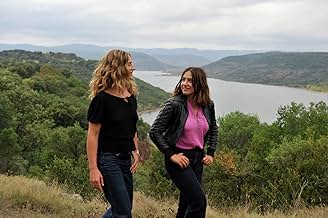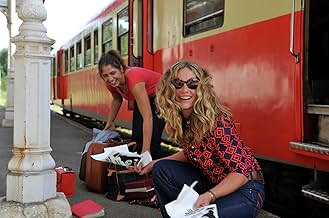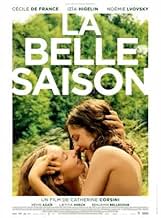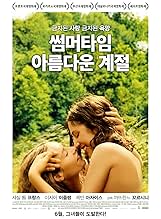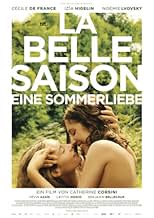La belle saison
- 2015
- Tous publics
- 1h 45m
IMDb RATING
6.7/10
6.1K
YOUR RATING
A young woman moves from the French countryside to Paris and begins a passionate love affair with a feminist leader in this drama set in 1970s France.A young woman moves from the French countryside to Paris and begins a passionate love affair with a feminist leader in this drama set in 1970s France.A young woman moves from the French countryside to Paris and begins a passionate love affair with a feminist leader in this drama set in 1970s France.
- Director
- Writers
- Stars
- Awards
- 3 wins & 8 nominations total
Cécile de France
- Carole
- (as Cécile De France)
Natalie Beder
- Marie-Laure
- (as Nathalie Beder)
Nathalie Lovigui
- Une militante MLF dans l'amphi
- (as Nathalie Lovighi)
- Director
- Writers
- All cast & crew
- Production, box office & more at IMDbPro
Featured reviews
This is a sensitive portrayal of two women from different backgrounds in conservative, rural France. Delphine, a country girl in Paris is introduced to feminism at a time (1971) shortly after the student riots in Paris, the bra-burning feminism of late 60s USA, and the teen-led cultural revolution in music, art and fashion. Paris was a world away from her farm in the Limousin. It is a film about feminism and lesbianism with strong female leads directed by an experienced female director who was, herself, a teenager at the time the film was set. As such it is authentic and tender, not titillating. It is a film about relationships, between Delphine and her mother, her Parisian girlfriend, the boy she is expected to marry and above all the conflict between the city and the country.
It is a film that could only be made in Europe and only set in the 70s and was justifiably nominated for a Lumiere, France's equivalent to the Golden Globes. Jellybeansucker should stick to sucking jelly beans and watching simplistic action movies. This is for those who prefer content to pace.
It is a film that could only be made in Europe and only set in the 70s and was justifiably nominated for a Lumiere, France's equivalent to the Golden Globes. Jellybeansucker should stick to sucking jelly beans and watching simplistic action movies. This is for those who prefer content to pace.
It's 1971 France. Delphine Benchiessa (Izïa Higelin) works at her family's rural farm. Her father berates her for being too slow to find a man. Unbeknownst to him, she's a lesbian. Her girlfriend surprises her by marrying a local boy. In Paris, she gets caught up with a group of militant feminists. She falls for their leader Carole (Cécile de France). After her father suffers a stroke, Delphine is forced to go home and take care of the farm.
It's another version of the tragic lesbian love story. I do wonder if 1971 France is a little too late to have this story. Usually, it's Victorian ladies on a gravel beach trying to discover lesbianism. In reality, rural conservatism and family dynamics do account for it. These ladies are not ignorant of the world. The 70's is not all disco and gay. It's still a fight for rights and acceptance. The danger isn't as high, and the story becomes smaller. Delphine could always run off and abandon the farm. It's not like society prevents her from getting a job in Paris. The issue becomes more internal and personal. It's a relationship movie.
It's another version of the tragic lesbian love story. I do wonder if 1971 France is a little too late to have this story. Usually, it's Victorian ladies on a gravel beach trying to discover lesbianism. In reality, rural conservatism and family dynamics do account for it. These ladies are not ignorant of the world. The 70's is not all disco and gay. It's still a fight for rights and acceptance. The danger isn't as high, and the story becomes smaller. Delphine could always run off and abandon the farm. It's not like society prevents her from getting a job in Paris. The issue becomes more internal and personal. It's a relationship movie.
This story of a relationship between a farmer's daughter and the woman she meets in Paris is effective in some ways. Set in the early 70s in the first flush of modern feminism, the plot is pretty simple and the issue simpler - will they stay together against the pressures of rural society? Izia Hegelin makes an effective and believable daughter of the soil, struggling to reconcile her feelings and her ties to her land and family; in an underwritten role as her lover, Cecile de France is less effective but does her best. Some good scenes showing the sometimes silly behaviour of activists and their disconnect from real life. The ending seemed slightly unlikely to me in some ways. There are sex scenes but they are neither very erotic nor graphic. So - worth seeing, but only a moderately good film.
The film, set in 1971, tells the story of the lesbian relationship between Delphine, a farmer's daughter, and Carole, a feminist activist, who meet when Delphine moves to Paris. This does not, however, mean that Delphine is an innocent country girl seduced by the more sophisticated Parisian older woman. It is the exclusively lesbian Delphine who is more experienced than the bisexual Carole- indeed, Carole's previous relationships have all been with men, and she has a boyfriend at the time when she meets Delphine.
Things change when Delphine's father Maurice has a stroke and Delphine, an only child, is forced to return to help her mother Monique run the farm. Carole follows her, but they quickly realise that pursuing their relationship in the countryside will not be easy. In the cosmopolitan atmosphere of Paris, at least in the radical circles in which Carole and Delphine move, lesbianism is widely accepted. In "La France Profonde" it is not. Delphine's parents have no idea that she is a lesbian, although some people in the area are beginning to suspect, and they believe that she will marry Antoine, a local boy who is interested in her.
The climax of the film comes when Monique finds Delphine and Carole in bed together. Believing that the older woman has corrupted her daughter, Monique angrily orders Carole to leave her house and never return. Delphine must decide where her future lies. This is not simply a question of deciding between her love for Carole and her loyalty to her family. Delphine has also realised that she loves the countryside, rural traditions and the life of the farm. She therefore also has to decide between her love for Carole and the profession and lifestyle in which she feels most comfortable. I won't give away the ending by revealing which choice she makes.
The film was shown in Britain as "Summertime", but I prefer the original French title "La Belle Saison", partly to avoid confusion with the David Lean film from 1955 with Katharine Hepburn, partly because it seems to me to have more layers of meaning. The romance between Delphine and Carole can be seen as the "beautiful season" of their lives; perhaps the so-called "sexual revolution" of the late sixties and early seventies also seemed like a "beautiful season" to those who lived through it.
Being a heterosexual British male, I am probably not the demographic at which a French lesbian-feminist film is aimed, but I must say that I enjoyed "La Belle Saison". When you can see past some of its preaching, especially on the abortion issue, it emerges as a very good film. Both the lead actresses, Cécile de France and Izïa Higelin, play their parts very well, and the attractive photography of the French countryside- it was shot in the Limousin- give it something of the look of a British "heritage cinema" drama. The period angle reminds us that the past- even the relatively recent past within my own lifetime- is (as L P Hartley said) another country where they do things differently. One likes to think that fifty years on things would be easier for Delphine and Carole than they were in 1971. Perhaps in France, even rural France, they would be, but in some parts of the world I am not so sure. The film reminded me of a recent British film, "Tell It to the Bees", another period drama (in that case set in the fifties) about a lesbian couple confronted with a difficult life choice. Like that film, "La Belle Saison" is a sensitively made, well-acted human drama and a plea for tolerance. 7/10.
Things change when Delphine's father Maurice has a stroke and Delphine, an only child, is forced to return to help her mother Monique run the farm. Carole follows her, but they quickly realise that pursuing their relationship in the countryside will not be easy. In the cosmopolitan atmosphere of Paris, at least in the radical circles in which Carole and Delphine move, lesbianism is widely accepted. In "La France Profonde" it is not. Delphine's parents have no idea that she is a lesbian, although some people in the area are beginning to suspect, and they believe that she will marry Antoine, a local boy who is interested in her.
The climax of the film comes when Monique finds Delphine and Carole in bed together. Believing that the older woman has corrupted her daughter, Monique angrily orders Carole to leave her house and never return. Delphine must decide where her future lies. This is not simply a question of deciding between her love for Carole and her loyalty to her family. Delphine has also realised that she loves the countryside, rural traditions and the life of the farm. She therefore also has to decide between her love for Carole and the profession and lifestyle in which she feels most comfortable. I won't give away the ending by revealing which choice she makes.
The film was shown in Britain as "Summertime", but I prefer the original French title "La Belle Saison", partly to avoid confusion with the David Lean film from 1955 with Katharine Hepburn, partly because it seems to me to have more layers of meaning. The romance between Delphine and Carole can be seen as the "beautiful season" of their lives; perhaps the so-called "sexual revolution" of the late sixties and early seventies also seemed like a "beautiful season" to those who lived through it.
Being a heterosexual British male, I am probably not the demographic at which a French lesbian-feminist film is aimed, but I must say that I enjoyed "La Belle Saison". When you can see past some of its preaching, especially on the abortion issue, it emerges as a very good film. Both the lead actresses, Cécile de France and Izïa Higelin, play their parts very well, and the attractive photography of the French countryside- it was shot in the Limousin- give it something of the look of a British "heritage cinema" drama. The period angle reminds us that the past- even the relatively recent past within my own lifetime- is (as L P Hartley said) another country where they do things differently. One likes to think that fifty years on things would be easier for Delphine and Carole than they were in 1971. Perhaps in France, even rural France, they would be, but in some parts of the world I am not so sure. The film reminded me of a recent British film, "Tell It to the Bees", another period drama (in that case set in the fifties) about a lesbian couple confronted with a difficult life choice. Like that film, "La Belle Saison" is a sensitively made, well-acted human drama and a plea for tolerance. 7/10.
An enjoyable film, with some great performances; but less travelled country roads should be rather more bumpy.
While a far from novel story, the three female leads (Izïa Higelin, Cécile de France and Noémie Lvovsky) give pitch perfect performances.
Where this film falls down is in giving the two lovers, far too smooth a ride. If you're fighting for freedom, surely the establishment would offer far more resistance? Here, the revolutionaries hardly seem to experience any push-back. There's one bump in the road, but that's really it.
While a far from novel story, the three female leads (Izïa Higelin, Cécile de France and Noémie Lvovsky) give pitch perfect performances.
Where this film falls down is in giving the two lovers, far too smooth a ride. If you're fighting for freedom, surely the establishment would offer far more resistance? Here, the revolutionaries hardly seem to experience any push-back. There's one bump in the road, but that's really it.
Did you know
- TriviaDirector Catherine Corsini stated that she named the two main characters Carole and Delphine after real life artists and feminists Carole Roussopoulos and Delphine Seyrig.
- GoofsAfter a swim in the pond, the girls lay out to take some sun. As Carole lays naked on the blanket resting her head on Delphine, her arms are raised and we can see she does not have any underarm hair. As the girls start to kiss and caress Carole's armpit is exposed again but this time full of underarm hair.
- ConnectionsReferenced in Théo et Hugo dans le même bateau (2016)
- SoundtracksL'Hymne du MLF, d'apres Le Chant des Marais
(Johann Esser/Wolfgang Langhoff/Rudi Goguel)
With the kind permission of Edition Peters Group
All rights reserved
- How long is Summertime?Powered by Alexa
Details
- Release date
- Countries of origin
- Official site
- Languages
- Also known as
- Summertime
- Filming locations
- Haute-Vienne, France(scenes in the country)
- Production companies
- See more company credits at IMDbPro
Box office
- Budget
- €4,800,000 (estimated)
- Gross US & Canada
- $35,322
- Opening weekend US & Canada
- $15,413
- Jul 24, 2016
- Gross worldwide
- $3,778,938
Contribute to this page
Suggest an edit or add missing content


![Watch Bande-annonce [OV]](https://m.media-amazon.com/images/M/MV5BMzZiZTVkNWItZGNjYS00ZDY2LWFkOGItZjhkNTk2NDQ3ZDE2XkEyXkFqcGdeQXRyYW5zY29kZS13b3JrZmxvdw@@._V1_QL75_UX500_CR0)


